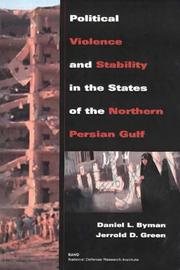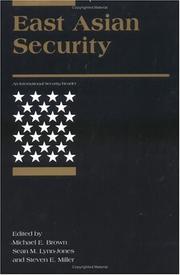| Listing 1 - 10 of 168 | << page >> |
Sort by
|
Book
ISBN: 0833083430 0833080903 9780833083432 9780833080905 Year: 2013 Publisher: [Santa Monica, CA] RAND Corporation
Abstract | Keywords | Export | Availability | Bookmark
 Loading...
Loading...Choose an application
- Reference Manager
- EndNote
- RefWorks (Direct export to RefWorks)
Political stability --- Mali --- Politics and government --- Destabilization (Political science) --- Political instability --- Stability, Political --- Consensus (Social sciences) --- Legitimacy of governments
Book
Year: 2019 Publisher: Washington, D.C. : The World Bank,
Abstract | Keywords | Export | Availability | Bookmark
 Loading...
Loading...Choose an application
- Reference Manager
- EndNote
- RefWorks (Direct export to RefWorks)
This policy note was prepared in parallel to the report Pakistan at 100- Shaping the Future. The report Pakistan at 100 discusses options to accelerate and sustain growth in Pakistan so that the country becomes an upper middle-income country when it turns hundred years old in 2047. This policy note discusses the need for strong governance to accelerate and sustain Pakistan's growth. Strong governance will require improved transparency and accountability, so policies are designed and implemented to benefit Pakistan's population.
Democratic Government --- Elite Capture --- Governance --- National Governance --- Political Instability --- Public Sector Development --- Public Sector Management and Reform --- State-Owned Enterprises
Book
Year: 2017 Publisher: Washington, D.C. : The World Bank,
Abstract | Keywords | Export | Availability | Bookmark
 Loading...
Loading...Choose an application
- Reference Manager
- EndNote
- RefWorks (Direct export to RefWorks)
The World Bank Group conducted face-to-face interviews with top managers and business owners of 1,000 enterprises in Thailand from November 2015 through June 2016. The Enterprise Survey (ES) sample is representative of Thailand's formal private sector. The ES covers several aspects of business environment along with measures of firm performance. The main highlights from the survey are: Thai firms underperform comparator economies in both annual sales and employment growth; female participation in ownership or management of the private sector is higher than in comparator economies; firms' engagement in trade is lower in Thailand than in comparator economies; and political instability is most frequently cited as the biggest obstacle to private firms' operations.
Business Environment --- Business in Development --- Electricity --- Investment Climate --- Political Instability --- Private Sector Development --- Private Sector Economics --- Trade
Book
Year: 2011 Publisher: Washington, D.C. : The World Bank,
Abstract | Keywords | Export | Availability | Bookmark
 Loading...
Loading...Choose an application
- Reference Manager
- EndNote
- RefWorks (Direct export to RefWorks)
In Madagascar, donors have traditionally counted for almost half of the government's budget and have been, by far, the main source of funding in social sectors. Since the beginning of the crisis, official aid toward education, health, and social protection surged, reaching almost USD 260 million in 2010 against USD 180 million in 2008. This increased failed nonetheless to improve significantly social indicators. Official aid flows have been cut since beginning of the political crisis except to social sectors where donors have increased significantly their disbursements between 2008 and 2010. This increase has been justified on humanitarian grounds, to respond to the growing social distress of the population. Unfortunately, most social indicators have continued to fall, as evidenced by the recent drop in net registration rate in primary schools, the rate of births attended by medical staff, and the use of external medical consultations.
Aid Effectiveness --- Development Economics & Aid Effectiveness --- Donors --- Foreign Aid --- Governance --- Health --- Macroeconomics and Economic Growth --- Political Instability --- Politics and Government
Book

ISBN: 0691022453 0691610355 0691638489 1400858216 0691076995 1322006318 9781400858217 9780691076997 9780691022451 9780691610351 Year: 2014 Publisher: Princeton, NJ
Abstract | Keywords | Export | Availability | Bookmark
 Loading...
Loading...Choose an application
- Reference Manager
- EndNote
- RefWorks (Direct export to RefWorks)
The articles in this volume appeared first in the leading jounial World Politics. The essayists' common concern with the autonomy of the political " in the politics of developing countries contributes to the analytical unity of the volume.Originally published in 1986.The Princeton Legacy Library uses the latest print-on-demand technology to again make available previously out-of-print books from the distinguished backlist of Princeton University Press. These editions preserve the original texts of these important books while presenting them in durable paperback and hardcover editions. The goal of the Princeton Legacy Library is to vastly increase access to the rich scholarly heritage found in the thousands of books published by Princeton University Press since its founding in 1905.
Book
ISBN: 9780275998288 Year: 2008 Publisher: Westport Praeger
Abstract | Keywords | Export | Availability | Bookmark
 Loading...
Loading...Choose an application
- Reference Manager
- EndNote
- RefWorks (Direct export to RefWorks)
Developing Countries --- Political stability --- Destabilization (Political science) --- Political instability --- Stability, Political --- Consensus (Social sciences) --- Legitimacy of governmentsPolitics and government. --- Legitimacy of governments --- Politics and government. --- Developing countries
Book
ISBN: 1464801142 Year: 2013 Publisher: Washington, D.C., The World Bank,
Abstract | Keywords | Export | Availability | Bookmark
 Loading...
Loading...Choose an application
- Reference Manager
- EndNote
- RefWorks (Direct export to RefWorks)
The post-revolutionary economies of MENA - Egypt, Tunisia, Libya and Yemen - have been recovering after a period of growth decelerations in 2011. In Egypt and Tunisia, the growth dips of 2011 were less dramatic than the declines observed during previous transitions. The recovery has been relatively quick but the transition process is far from complete and uncertainty about the political and reform process remains a binding constraint to private investment. Consequently, post-transition growth is below potential and is lower than growth prior to the Arab Spring, with negative consequences for employment and poverty. Events in the post-revolution economies have affected other countries in MENA. Macroeconomic fundamentals weakened in most developing MENA countries in 2011-12 as growth slowed and governments responded to social pressures with expansionary fiscal policies. The regional growth outlook for 2013 reflects weaker expected global economic activity, especially in the EU, and moderating oil prices. Regional economic growth is expected to decelerate to 3.5% in 2013 from 5.5% in 2012. Prolonged political and policy uncertainty and social unrest are serious downside risks to the outlook.
Book
ISBN: 0190093528 0190093501 019009351X Year: 2020 Publisher: New York : Oxford University Press,
Abstract | Keywords | Export | Availability | Bookmark
 Loading...
Loading...Choose an application
- Reference Manager
- EndNote
- RefWorks (Direct export to RefWorks)
This volume compares the two most powerful authoritarian states in global politics today: Russia and China. For all their power and money, both regimes have faced difficult trade-offs in seeking both political stability and reliable information about society while confronting the West and its international influence. They have also made different choices: Russia today is a competitive authoritarian regime, while China is a non-competitive authoritarian regime. Despite the different paths taken after the tumultuous events of 1989, both regimes have returned to a more personalized form of authoritarian rule.
Political participation --- Political stability --- Authoritarianism --- China --- Russia (Federation) --- Politics and government --- Political science --- Authority --- Destabilization (Political science) --- Political instability --- Stability, Political --- Consensus (Social sciences) --- Legitimacy of governments

ISBN: 0833043390 0585245150 9780585245157 9780833043399 9780833027269 0833027263 0833027263 Year: 1999 Publisher: Santa Monica, CA Rand
Abstract | Keywords | Export | Availability | Bookmark
 Loading...
Loading...Choose an application
- Reference Manager
- EndNote
- RefWorks (Direct export to RefWorks)
Political violence threatens the lives of U.S. soldiers and the stability of U.S. allies throughout the world. This report examines the threat of political violence in the Persian Gulf states of Saudi Arabia, Kuwait, Bahrain, and the United Arab Emirates and the best means of reducing that threat. It assesses sources of discontent, common reasons for anti-regime politicization, potential triggers of violence, and the influence of foreign powers. The report then describes the strategies that regimes in the area have used to interfere with political organization and to counter violence in general. The report concludes by noting implications of political violence for both the United States and its allies in the Gulf, and by assessing the impact of various measures that could reduce violence: enacting political and economic reforms in the Gulf; changing the U.S. presence in the region through new basing and operational approaches; increasing a European role in Gulf security; coercing foreign powers that contribute to violence; strengthening the U.S.-Gulf partnership; and improving military-to-military ties.
Political violence --- Political stability --- Destabilization (Political science) --- Political instability --- Stability, Political --- Consensus (Social sciences) --- Legitimacy of governments --- Violence --- Political crimes and offenses --- Terrorism

ISBN: 0262287048 0585330123 9780262287043 9780585330129 0262522209 Year: 1998 Publisher: Cambridge, Mass. MIT Press
Abstract | Keywords | Export | Availability | Bookmark
 Loading...
Loading...Choose an application
- Reference Manager
- EndNote
- RefWorks (Direct export to RefWorks)
National security --- Political stability --- Military & Naval Science --- Law, Politics & Government --- Armies --- Destabilization (Political science) --- Political instability --- Stability, Political --- Consensus (Social sciences) --- Legitimacy of governments --- East Asia --- Economic conditions.
| Listing 1 - 10 of 168 | << page >> |
Sort by
|

 Search
Search Feedback
Feedback About UniCat
About UniCat  Help
Help News
News